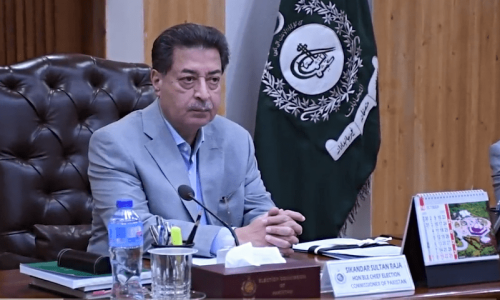MORE than two years after MNAs loyal to former prime minister Imran Khan fatefully resigned from the legislature following the April 2022 vote of no-confidence, the PTI returns to the National Assembly.
The Election Commission has finally acknowledged 39 of the party’s 80 returned candidates as ‘PTI lawmakers’, thereby implementing one part of the Supreme Court’s judgement in the reserved seats case. It may be recalled that these 39 candidates had, in one way or another, indicated their affiliation with the party before the Feb 8 general election.
For the 41 more candidates unable to do so, the court had given another opportunity to re-state their affiliation through signed and notarised statements submitted to the ECP. However, even though most of these 41 candidates have already filed their statements, their status remains pending as the ECP is now ‘confused’ about how their allegiance is to be verified.
Time will tell whether the ECP has been hostile towards the PTI under compulsion or for some other reason. Whatever the case may be, it has appeared obvious for a while that its priorities seem to be something other than midwifing and facilitating the democratic process.
If the Commission were working solely to ensure that all parties with a public mandate were given their rightful place in parliament, it would not have continued dragging its feet on the clear-cut order from the Supreme Court in the reserved seats case. That it is still finding reasons to frustrate the smooth implementation of the verdict is troubling, not least because a host of regime-aligned ‘analysts’ have appeared on TV screens since the judgement was issued to claim rather confidently that the reserved seats will ‘never’ be given to the PTI. One hopes that this is not some part of a conscious effort to thwart the Supreme Court.
The remaining lawmakers who wish to be associated with the PTI must be declared to be the party’s candidates forthwith, and the process must move on to the allocation of the reserved seats it is entitled to by virtue of its position in the National Assembly.
As 11 judges of the Supreme Court pointed out, it was the ECP’s fault that the PTI was unable to take part in the recent general election as robustly as it would have wished. It is, therefore, its responsibility to set right all the wrongs it committed in the process. If some semblance of fairness is restored in parliament, the political system may be able to start functioning as intended.
Faith in the Pakistani democracy has dwindled to dangerously low levels due to the flawed election exercise held on Feb 8, and implementing the Supreme Court’s order may even help calm the overall situation and lower the political temperatures somewhat.
Published in Dawn, July 27th, 2024














































Dear visitor, the comments section is undergoing an overhaul and will return soon.